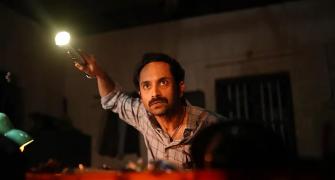Though the lies hardly go beyond extramarital affairs and conception problems, they are laid out by arresting storytellers who raise the stakes while speaking in tongues not wiped clean to make progressive points (No Made in Heaven-type diddling, here), notes Sreehari Nair.

O Scheherazade, what's your lie?
Come to think of it, this is the sort of storyline that Jean Renoir and Robert Altman specialised in: People gathered around for an event or a celebration, and the clash of personalities that follows.
But whereas Renoir and Altman had a sense of balance and proportion, and they turned the 'carnival' genre into a source of rich, satirical comedies, an air of faux-solemnity has begun to pervade the genre of late.
While Monsoon Wedding may be an exception to the rule, most films of this category are like Rahul Chittella's Gulmohar, which seemed defiant in its belief that lurking in the background of every get-together of every happy family are dark secrets waiting to tumble out.
In the course of such narratives, somebody or other becomes aware of his own illegitimacy, somebody owns up to her sexuality, a token pedophile emerges from the shadows, and the glum-faced critic gets his chance to proclaim that the film 'takes the shine off our sacred institutions'.
In truth, there's nothing like the pleasure of a superbly calibrated performance to discover in the carnival films of today, and their preciosity often becomes too much to bear.
Let me also add that contrary to the glum-faced critic's assessment, these films do not hurt our sacred institutions in the slightest. If anything, they provide the comfort of soap opera gossip under the guise of cultural purification.
All this by way of introducing Thamar K V's Malayalam film, 1001 Nunakal (1001 Lies), which is the work of a talented film-maker, though hampered in part by the recently acquired bad habits of the carnival genre.
Thamar sets up the film with an original eye, in the UAE of sanitised streets, fast-food signs lettered in Arabic, order and discipline, an overall whiteness.
The milieu for the carnival is the 10th anniversary of a rich UAE-settled Malayali couple, not ostentatiously rich but well-to-do nonetheless, their mansion an endorsement for the term 'casual swank'.
At this mansion arrive old friends, three other married couples and the demoniac presence in the group, a Bluto-like divorce lawyer who wishes to see the dirt behind the primly dressed souls. Soon Bluto proposes that the couples play a game of truth-telling, or better yet, of lie-busting.
Admitting to your spouse a lie you had said in the past, and that too in front of a large group, is not just masochistic but also kind of dumb; and the assembled characters do not suggest enough quirk of personality.
What's more, there is no history of togetherness that comes through in their back-and-forth.
The ribbing and the jousting are quite glib.
The catcalls are devoid of everyday poetry, they lack the rhythm of unvarnished daily-speak.
I even wondered at one point: How could a bunch of Malayalis have kept their friendship alive over banters so anemic?
And yet, things slowly start to simmer and gain in pungency.
They may come short in the matter of establishing a believable group dynamic but the actors are all competent. And though the lies hardly go beyond such standard tropes as extramarital affairs and conception problems, they are laid out by arresting storytellers who raise the stakes while speaking in tongues not wiped clean to make progressive points (No Made in Heaven-type diddling, here).
Besides, each couple convinces you that they are indeed a couple, sells the idea that they are stewing in the marital cooker of small frustrations and dashed hopes -- and that goes a long way in sustaining your interest.
You are invested also because this happens to be a story fought on many fronts. The couples play 'confession', moving from the hall-room to the garden, from drinks to barbecue, while the maid is putting away the dirty dishes one by one and worrying about her husband who is badly in debt and threatening suicide.
The contrast between the bored rich, engaged in their callous games, and the plights of their butlers and cooks, trapped in life-and-death situations, is a time-honoured staple of the carnival genre. In this case, however, the maid turns out to be so much more than an upholder of staples: she illuminates the film from the kitchen out.
Yes, some of the finest scenes in 1001 Nunakal are those involving the wound-up maid and her hustler of a husband. These are the scenes to watch out for, where the writing touches the sublime, where grungy truths are revealed to us through fleeting details.
The first time we meet the suicidal husband, he is in a grand-seeming vehicle, discussing business deals. The maid shuffles in, and as they get ready to drive off, the camera pulls back and we see that the grand vehicle is actually a pickup truck.
Such is their chemistry, expressed through economical gestures and in the interstices of casual talk, over gritted teeth and banana fritters.
Stopping at a friend's snack joint, he asks her if she would like to have some fritters and she, calculating in her head the money that stands to be wasted, says no. He then walks out of the joint inhaling the fritters, which he says were essentially leftovers, and you can feel her disappointment at having turned down those free bites.
The movie has stretches like the aforementioned one, full of fresh perceptions, and they are propped up in large measure by Remya Suresh, who plays the maid.
She is one of those great practitioners of actorly control, somebody who gives you the impression that she might tip over into melodrama anytime -- but who never tips over.
Remya Suresh is so good that when she cries, she ends up exposing the hollowness of the too-swoony background score, which has a difficult time catching up with her.
And Zhinz Shan, the pickup-truck-hauling husband, is just as authentic, infusing into his gingery movements the remnants of a life lived on the edge. Together, they are like the innkeepers of Les Miserables made real, a surrogate for every away-from-their-roots couple, penny-pinching and window dressing, all the while holding onto their dream of 'someday going home'.
Such echoes that he effortlessly generates are what work in Thamar K V's favour; they are what provide you with layers of enjoyment that transcend the plot.
There's a building fire at the start and later a barbecue fire that's slowly stoked, and if you think about it there's quite a bit of flickering and raging that happens before the evening comes to a close.
The revelations don't singe and the aftershocks are too easily rationalised (Invoked more than once is that mother of all clichés: 'Nobody's perfect'), but as the game motors on, the lies that the characters confess to having said themselves get questioned.
'Is she honest about her lies or is she making them up to get through the evening?'
That becomes the overriding mystery.
It ties into the mystery of good old Scheherazade making up tales to escape the wrath of her savage husband, and you are reminded, yet again, that you are in the magical land of Arabian Nights.
1001 Nunakal may not be a great movie but it offers intimations of future greatness.
1001 Nunakal streams on SonyLIV.











